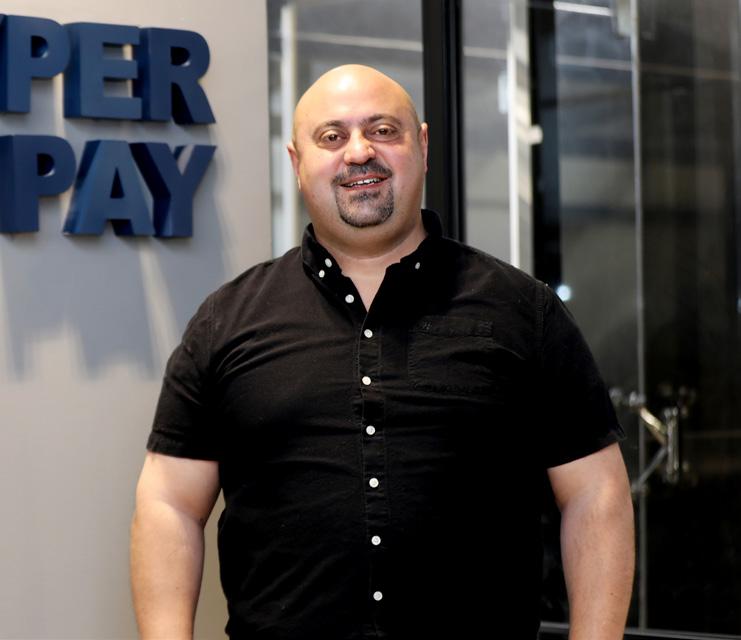
57 minute read
I Dreaming Big
• TOP 25 FINTECH COMPANIES •
MUHANNAD EBWINI DREAMING BIG
Advertisement
Fresh from securing $36.7 million in new funding, Muhannad Ebwini, Founder and CEO of Saudi’s HyperPay, is now looking at regional expansion. New products and a potential IPO are on the horizon.
In June 2022, Saudi Arabia-based payment gateway HyperPay confirmed its latest round of funding. Led by Mastercard, with participation from Amwal Capital Partners and AB Ventures, the deal saw HyperPay secure $36.7 million to fund its expansion, bringing its total funding raised to $55 million. For the founder and CEO, Muhannad Ebwini, this is just the beginning. “Our plan is to go public through an IPO in two years in Saudi Arabia,” he says with confidence.
Established in 2015, HyperPay provides ecommerce businesses with a range of online payment solutions, including merchant cash advances, B2B systems, card issuing, and open banking. Recent years have witnessed impressive growth. In 2021, it executed 112 million transactions worth a total of $4.7 billion, compared to 79 million transactions totaling $2.4 billion in 2020. Headquartered in Riyadh, the company also has offices in Jordan and the U.A.E. The new funding is earmarked to help the company expand into Egypt, Bahrain, Iraq, and Oman, as well as take it public. “We were looking for strategic investors, not cash investors,” explains Ebwini. “We were looking for someone who can help us in the products side and has the know-how and support in the market.”
As part of the deal, Mastercard will provide more products to HyperPay, while the latter will help the digital payment giant to distribute and push these products among banks, merchants, and across a variety of different sectors in the market. Meanwhile, private equity fund Amwal Capital specializes in taking companies public, so will help HyperPay prepare its financials in readiness for its planned IPO. And AB Ventures, the VC arm of Arab BLC Bank, will support HyperPay’s geographical expansion plans to countries like Algeria, Tunisia, and Palestine. “We recognize the crucial role Fintechs are playing in our world’s rapid digital transformation,” says Adam Jones, Country General Manager for MENA Central at Mastercard. “Growing the payments ecosystem is crucial for the development of a robust digital economy that is more inclusive for all. Our partnership with HyperPay is meant to power the use of new technologies, grow digital commerce across the region, and bring practical innovation to millions of consumers.”
Jordanian entrepreneur Ebwini is no stranger to startup building and scaling. He began his career in 2001 at Maktoob.com, which was the first successful webmail service with Arabiclanguage support. Founded in Jordan in 1999 by Hussam Khoury and Samih Toukan, it was also a breeding ground for entrepreneurial talent. Joining the company as a sales and marketing executive, Ebwini found himself working
BY LAYAN ABO SHKIER
alongside Ronaldo Mouchawar, who went on to found Souq.com and is today Vice President for Amazon in MENA, and Fadi Ghandour, who went on to found Aramex and is today Managing Partner at Wamda Capital. Khoury and Toukan are today the founders of the Jabbar Internet Group. “I learned how to innovate new ideas that are not available in the market and how to educate the market and take it to the next level with these ideas,” says Ebwini. The cofounders sold Maktoob.com to Yahoo for a reported $164 million in 2009.
Ebwini had already moved on by then, joining the National Technology Group in Saudi Arabia in 2004, which was focused on growing the burgeoning digital economy in the Arab world at that time. It’s this role that Ebwini credits with incubating his entrepreneurial skills. The group helped launch a range of tech-based projects, such as real-time Saudi Stock market information service Mubasher and pioneering online payment provider OneCard. “It was the age of the prepaid cards, where each service had its own prepaid card, like internet service providers, games, some websites, everything had a card,” Ebwini remembers. Prepaid cards, which consumers topped up with money, were not linked to a bank account and could be used for online purchases. “The initial idea of OneCard was to have all these prepaid cards together in one card, hence the name,” he adds. OneCard was later developed to able to be used at online checkouts, enabling users to pay directly on websites at a time when e-commerce was still an emerging market.
This sparked an idea for Ebwini. In 2010,
Muhannad Ebwini, Founder and CEO of Saudi’s HyperPay
he left Saudi Arabia and returned to Jordan, where he used his e-commerce and payments experience with Maktoob. com and OneCard, as well as his degree in computer science, to establish Gate2Play, an online aggregator for payment cards targeting international merchants in MENA specializing in online content and online games. He began approaching previous colleagues, hiring new people, and gathering initial funding from investors. “At OneCard, I was working on a 5-10% margin, while at Gate2Play I could work within a 0.2% margin,” explains Ebwini. According to the founder, Gate2Play grew steadily over the next four years, adding other services for its international digital merchants, such as localization services and community management, and signing agreements with EA Sports, Zynga, Travian, and Facebook, among others.
However, by 2014, the world had changed, and technology had moved on. Ebwini admits that the Arab Spring uprisings of the early 2010s had taken his attention away. “We woke up in late 2013/early 2014, and technology had shifted,” he recalls. With his main clients still being online gaming platforms, he realized that fewer games were being launched on consoles and websites—the smartphone and app stores were taking over.
Understanding that his business model had to be changed to fit the new market, he traveled to Silicon Valley in San Francisco to meet mentors and learn about the new world. Returning home, he relaunched Gate2Play as HyperPay, a payment gateway serving travel, ecommerce, and retail clients. He tested his new model in Jordan, then he looked to the U.A.E. and Saudi Arabia. Whereas in 2014, credit card penetration and ecommerce were already established and growing in the U.A.E., Saudi Arabia was at a much earlier stage. “It meant that we had to work really hard to educate the market,” says Ebwini. Still, in Saudi he had market knowledge and connections through his previous work, so he headed to Riyadh.
A key part of HyperPay’s service as a payment gateway is connecting digital merchants to partnering banks. Once HyperPay signs a new ecommerce merchant, it connects them with a banking partner, which provides them with a bank account that can be used with HyperPay’s gateway. According to Ebwini, in 2014 there were very few banks in Riyadh willing to acquire ecommerce business. The CEO had a job on his hands. “We started to talk to merchants and banks to convince them,”
he remembers. “We managed to convince six banks to become acquirers between 2015 and 2018. Today, every bank in the kingdom is an online acquirer.”
In 2016, HyperPay also started working with the Saudi Central Bank (SAMA) and Saudi Payments, a payment system and a subsidiary of SAMA, to open up more payment options in the kingdom. “We implemented the first project they had— Sadad Online Payment—and now we are the only independent payment gateway that has the new Mada system and other features that Saudi Payments is pushing in the market,” says Ebwini. Through this, HyperPay gradually gained the trust of government and banks, and it started to onboard merchants.
As it gained clients, HyperPay found that some of them needed tailored
Mastercard made a strategic investment in HyperPay to enhance its own capabilities and identify new technologies.
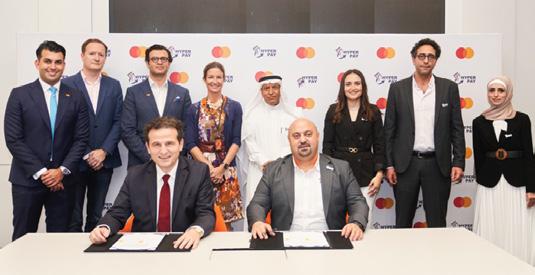
solutions. “You cannot serve all merchants equally,” says Ebwini. HyperPay set about focusing on building customized products for sectors such as insurance and aggregator companies, or for specific merchants that required a tailored solution to solve their problems.
Then 2020 hit. The onset of the global pandemic was a boost for Fintech companies. “As the world went into pandemic lockdown in 2020, and as stores closed and social distancing took hold, many retailers in the Middle East were forced to move their businesses online, embrace e-commerce and explore and adopt new ways to pay,” says Kamel Al Tawil, Managing Director of Equinix Middle East and North Africa. “This has naturally led many consumers in MENA to shift their spending habits away from more traditional forms of payment to embrace contactless tap-and-go payments and online shopping.”
HyperPay’s HyperBill service, which it initially launched in 2017, proved to be a lifeline for businesses as they
Stay connected
with our latest business news. adapted to the new normal. The online invoicing system enables merchants to create invoices, manage a billing cycle, and get paid, without any complicated setup and special website needed. “In the first month of the lockdown, around 1,000 new clients engaged with HyperBill,” says Ebwini. “We saved many businesses from bankruptcy.” It also introduced new sectors to the startup. “We were processing payments for the government, travel, or entertainment sectors. But all that stopped, and new categories bumped up really quickly like home appliances, electronics, and cosmetics,” he adds.
Today, HyperPay’s challenge lies in creating a business model that can cater to the needs of each new market. But with its coffers full of new funding and IPO plans underway, it appears ready for what comes next. “I would say for the coming five years at least, we will still be doubling or tripling our numbers,” says the CEO. “I believe we are in the beginning and there is so much potential.”
Maktoob.com Alumni
Maktoob.com was the first successful webmail service with Arabic-language support and was sold to Yahoo! for a reported $164 million in 2009. These five entrepreneurs all worked at Maktoob.com in its early days and have gone on to found and lead other well-known successful businesses in MENA.
Hussam Khoury and Samih Toukan: Founded Maktoob.com in 1998. Sold the business to Yahoo! In 2009 and founded Jabbar Internet Group in the same year.
Ronaldo Mouchawar: Founded Souq.com and is today Vice President for Amazon in MENA. Fadi Ghandour: Founded Aramex and is today Managing Partner at Wamda Capital.
Hussein Freijeh: Worked for Yahoo! as Managing Director for the Middle East, Africa, and Turkey. Today is general manager for MENA at Snapchat.
Striding Ahead: The Journey of a Petrochemical Giant
CEO Abdullah Al-Saadoon explains what makes Sahara International Petrochemical Company (Sipchem) one of the leading petrochemical giants in the world, and what it’s doing to drive sustainability.
The Sipchem-Sahara multi-billiondollar merger is considered a major milestone in the company’s history. What have the outcomes of the merger been so far? The Sipchem-Sahara merger followed Sipchem’s track record of delivering greenfield and brownfield projects. It was our first major merger and we overcame many challenges to deliver on its promise. The outcome so far is clearly tied to the strategic rationale of the deal. First, it has allowed us to diversify our products portfolio, and strengthen our competitive position through enhanced market access, unrivaled product expertise, and the sharing of complementary capabilities across both companies. Second, it has increased our scale and fortified our resilience to external challenges. This manifested itself clearly during the COVID-19 pandemic, where the merger proved a pivotal driver in our ability to record our highest net profits since the incorporation of the company.
Finally, the merger has enabled us to unlock significant synergies across the company. Back in 2019, we committed to our shareholders the delivery of 175 million SAR - 225 million SAR ($46.6 million - $60 million) in recurrent EBTIDA impact within three years of the merger deal. This target was surpassed six months ahead of schedule, reaching a synergy value of 298 million SAR ($79.5 million), and was achieved through the efforts of our teams and the benefits of our co-located assets.
In summary, I would say we are quite proud of what we have achieved – almost three years on, we have made what was originally on paper, into a reality.
Your 2021 financial results show a surge in profit. What are the reasons behind this growth? Sipchem’s net income reached SAR 3.59 billion ($957 million) last year, compared to SAR 175.9 million ($46.9 million) in 2020 – an increase of 1,942%. It is clear that the opening of the markets following the pandemic, and the surge in product prices, were main reasons for the improved performance of most of the petrochemicals company during 2021. However, the exceptional growth Sipchem witnessed compared to peer companies is attributed to the bold decisions made at the end of 2020 and beginning of 2021.
Following the merger, we immediately began working on key top-line and bottom-line initiatives. We optimized our portfolio, deciding to mothball three under-performing assets and bring back shares of our JV partners in others. We also invested in targeted plant reliability initiatives to maximize our production. In addition, we restructured the organization to reduce the number of management layers, creating a faster and more agile company ecosystem.
Two further initiatives included optimizing our fixed costs to leverage post-merger strength of both legacy companies and capitalizing on our physical presence in key markets. We achieved the latter through our two subsidiaries, Sipchem Europe in Switzerland, and Sipchem Asia in Singapore. This presence ensures we are in direct contact with our end customers in key demand markets.
You have been part of Sipchem’s growth story over the past two decades. How would you describe the evolution of the company? Throughout our rich history, we have been able to demonstrate a sustainable and consistent growth story. The first production facility of Sipchem was the methanol plant. It was the start of the journey and I still recall visiting the site when it was simply an undeveloped plot of land.
Our journey has been shaped by four distinct phases. Phase one focused on ‘build up’, where we established our methanol, butanediol, and derivates assets. The focus during this phase was the build-up of capabilities. We needed to establish a strong team and ground our company from the beginning in safety and executional excellence.
Scan this QR code to open the website
Abdullah Al-Saadoon, CEO of Sahara International Petrochemical Company (Sipchem)
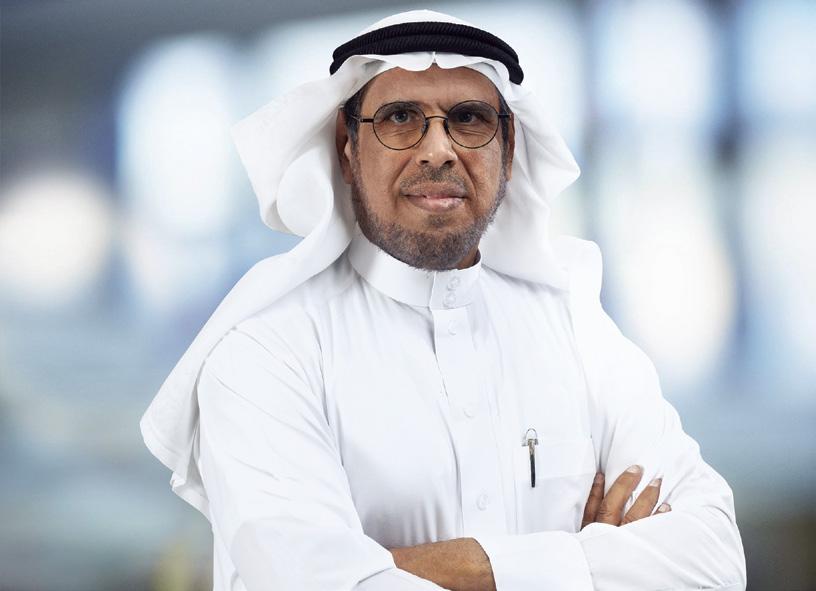
Phase two was about ‘ramp up’, where we established our acetyls business to further process our methanol down the petrochemical value chain. This was also around the time that Sipchem went public. In this phase, we continued our focus on executional excellence while seeking to maximize the value of our products across the value chain.
The third phase centered on exploration, with the company utilizing its phase one and phase two products to branch into another unique and important industry within the Kingdom of Saudi Arabia. This included our EA, PBT, EVA and GACI assets. Some of those ventures proved to be successful and others not so much. Also during this phase, we established our commercial arm, Sipchem Marketing Company (SMC), which allowed us to offtake our own product, internalize the margin, and be closer to our end customers.
Then came the evolution phase, which saw the merger with Sahara Petrochemical Company to create one of the largest integrated petrochemical companies in the region. The focus here was on driving scale quickly and driving synergies across assets. This accelerated our trajectory on our growth journey.
We are quite ambitious, and we have a capable leadership, strong teams, and a company culture that will support us to deliver. Our pursuit for future growth opportunities is the strongest it has ever been. Sipchem is considered one of the leading petrochemical companies in the world. What has been your strategy for success and how are you aligning it with Saudi Vision 2030? Through the first of its kind merger in the kingdom’s petrochemical sector and the exceptional postmerger performance, we have been able to build and strengthen our position and reputation in the market.
We have demonstrated results and created value thanks to the efforts of our employees. Building on the fantastic financial results of the recent year, the organization’s focus on achieving a performancebased work culture continues, as does its campaign to optimize cost
Scan this QR code to open the website
and increase productivity. Our culture aims to build a stronger, more resilient company, with unmatched ambitions when it comes to sustainable growth and global competitiveness.
Being part of the petrochemicals industry, Sipchem has naturally aligned itself with Vision 2030’s strategic objectives through its positive impact on the sector, which is vital to the Saudi economy. Sipchem also actively encourages nationalization of its jobs, with more than 82% of our workforce consisting of Saudi nationals as of April 2022. Another tangible manifestation of Sipchem’s alignment with Vision 2030 is our participation in the
Shareek program, a government investment program that aims to increase domestic investments in private sector companies. This has allowed us to further expand our business scope in accordance with a dynamic growth strategy that supports both domestic and international activities.
Furthermore, we are currently exploring various new business opportunities that are in line with both the Shareek program directives and our own growth strategy. The initiatives pipeline is flowing with new opportunities, and we are in the final stages of selecting the most feasible ones that would enhance the local economy and our company profitability. What steps have you taken on the journey to becoming a more sustainable company? We have always made every effort to meet all the traditional ESG metrics and expectations. However, those expectations are evolving, whether through our customer expectations relating to our products, investor expectations relating to their investments, or country-level expectations relating to new regulations.
We recognize the changes and the importance of ensuring that we evolve our practices and build a sustainable business model. With this in mind, we have recently moved forward with a total rehaul of our sustainability strategy. This will
include a long-term decarbonization plan for Sipchem’s various assets and products. Our sustainability targets will be announced soon after final refinements. They will include net zero carbon target dates, goals for reducing greenhouse gas emissions, low carbon footprint production, and various other essential environmental, social, and governance-related matters.
In addition to this, we have successfully implemented various initiatives that aim to reduce emissions and preserve natural resources. Such initiatives include modification of methanol production to recycle waste CO2 emissions in two of our plants, as well as from a neighboring company’s plant in Jubail Industrial City. The aim is to produce low carbon emission methanol and vastly reduce carbon dioxide emissions. We are also improving energy efficiency by meeting the targets set by the Saudi Energy Efficiency Center, affiliated with the Ministry of Energy, which recognized Sipchem highly for its environmental commitment.
Further initiatives include the conversion of pallets from wood to fully recyclable plastic, as well as the development of efficient wastewater and potable water management systems that enable better preservation of natural resources.
Sustainability forms a foundational pillar of our strategy, and this is where we will be driving significant capex in the coming years.
What are the company’s most prominent accomplishments regarding corporate social responsibility? Since its establishment, Sipchem has championed several causes on our corporate social responsibility (CSR) agenda, including investments in our community, and the company allocates 1% of its annual profit to CSR initiatives. Some notable examples include orphans’ programs, local community infrastructure support, entrepreneurship and youth empowerment, environment support, and education. Our programs have covered more than 76% of the geographical map of the Kingdom of Saudi Arabia, reaching more than one million beneficiaries.
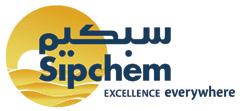
www.sipchem.com
THE MIDDLE EAST’S
TOP 25 FINTECH COMPANIES 2022
From e-payments to open banking and crypto-assets exchanges, Fintech companies are booming across MENA, driven by high demand from a young and increasingly digital-first population.
According to a report by KPMG, investment in Fintech companies in Europe, the Middle East, and Africa (EMEA) hit $77.4 billion in 2021, across 1,859 deals, compared to $26.7 billion in 2020. VC investment in Fintech skyrocketed in the EMEA region during the last year to hit $30 billion—more than tripling from its previous high of $9.9 billion in 2020.
Millions of people in the Middle East are still underserved in banking and payments, while areas like open banking, crypto, and equity trading are gaining ground across markets such as Bahrain, the U.A.E., and Egypt.
Payment companies dominate our 2022 list of the region’s top Fintech companies. Jordan’s MadfooatCom is one of the top performers after processing over $13 billion in transactions in 2021. Egypt’s Fawry, Saudi’s PayTabs, and Kuwait’s MyFatoorah are also helping revolutionize the sector in their home countries. Buy-now-pay-later platforms continue to draw interest, with four companies making it to the list: Saudi’s Tamara, Egypt’s ValU, and the U.A.E.’s tabby and Postpay.
Despite the unfavorable market conditions this year, crypto trading platforms are also still on the rise, with Bahrain’s Rain becoming a prominent player. The company bagged $110 million in a Series B funding earlier this year.
The U.A.E. dominates our 2022 Fintech list with eight entries, followed by Saudi Arabia and Egypt with five entries each.
Methodology
Our list of “The Middle East’s Top 25 Fintech Companies 2022” is presented in alphabetical order. It is not a ranking.
We compiled the list by considering companies that are applying technology to financial sectors including payments, insurance, blockchain and cryptocurrency, digital banking, investing and wealth management, and lending and personal financing. We excluded Fintech operations owned by exchange houses, traditional banks, governments, and telecommunication companies. • We gathered data through primary sources, statements, and questionnaires. We took into account: • The amount of money executed through the digital channels in 2021. • Number of app downloads and active users. • Number of countries that the companies operate in. • Growth over the past year. • Examples of innovation in digital payments. • Impact on consumers and businesses. • Funding from venture capitalists.
To nominate yourself or someone else for our lists, email: info@forbesmiddleeast.com

THE MIDDLE EAST’S
TOP 25 FINTECH COMPANIES 2022
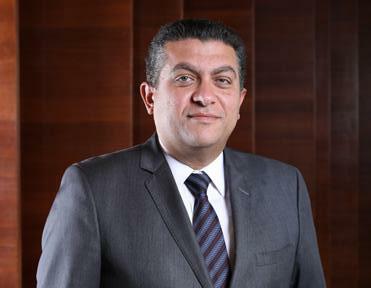
AMAN Holding
E-payment and financial services providers Founders: Mohamed Wahby, Hazem Moghazi Established in: 2015 Headquarters: Egypt A subsidiary of Raya Holding, AMAN provides e-payments, buy-now-pay-later (BNPL), microfinancing, and SME services. The company provides services to over two million consumers daily through 170,000 POS machines. AMAN also has a super app that enables ecommerce, bill and utility payments, charity donations, and gaming, among other things. The company processed transactions of $1.3 billion in 2021 and generated revenues of $170 million. As of July 2022, the app had been downloaded 800,000 times and had over 500,000 active users.
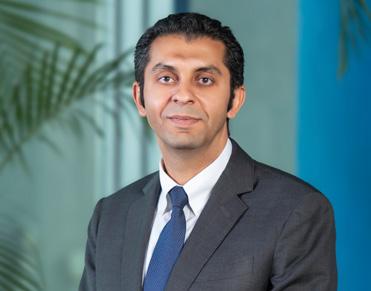
Beehive
SME-focused digital finance solutions provider Founders: Craig Moore Established in: 2014 Headquarters: U.A.E. Beehive is a peer-to-peer lending platform regulated by the Dubai Financial Services Authority. It provides digital finance solutions for SMEs, financial institutions, and investors. In 2021, the startup helped businesses borrow $120 million, a 200% growth compared to 2020. With headquarters in Dubai and offices in Saudi Arabia and Oman, the company had 15,500 users as of July 2022. Before founding Beehive, Craig Moore was the founder and COO of Butterfly Software, a U.K.-based data analytics and migration software company that was acquired by IBM in September 2012.
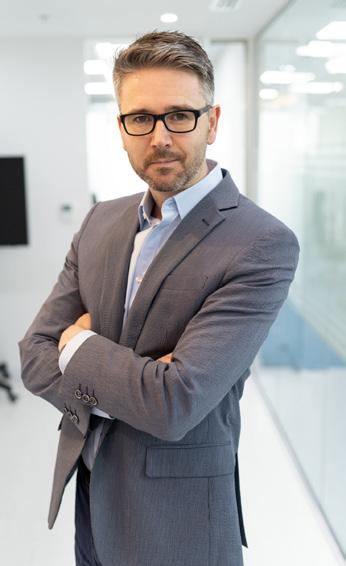
BitOasis
Crypto-asset exchange Founders: Ola Doudin, Daniel Robenek Established in: 2015 Headquarters: U.A.E. BitOasis allows users to buy, sell, and trade cryptocurrencies, such as Bitcoin, Ethereum, and XRP, among other currencies. BitOasis operates in the U.A.E., Bahrain, Kuwait, Oman, Saudi Arabia, Turkey, Qatar, Morocco, Egypt, Jordan, Iraq, Lebanon, and Tunisia. As of July 2022, the company had over 200,000 registered customers and an aggregate trading volume of $4 billion, of which $1.7 billion was generated in 2021. In 2021, it raised $30 million in a Series B funding round from regional and global investors.
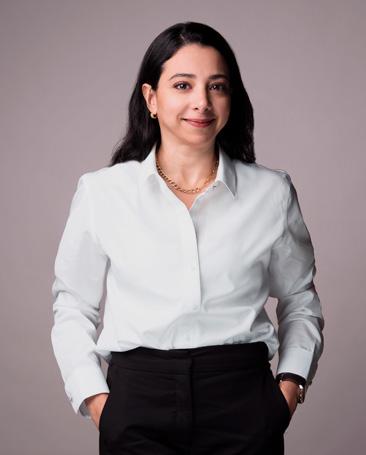
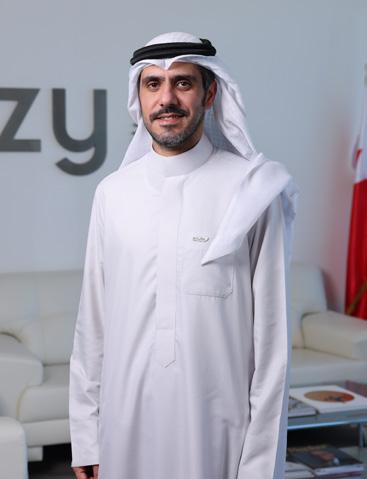
Eazy Financial Services
Payment services provider Founder: Nayef Tawfiq Al Alawi Established in: 2016 Headquarters: Bahrain Eazy is licensed and regulated by the Central Bank of Bahrain as a provider of online payment services, payment gateways, and POS systems. In 2020, it launched its EazyPay POS terminals and the EazyPay SoftPOS app, which allows local merchants and SMEs to accept contactless payments. With 900 merchants and more than 5,692 POS terminals across Bahrain, Eazy Financial helped process transactions worth a total of $794 million in 2021.
Fawry for Banking and Payment Technology Services
E-payment platform Founder: Ashraf Sabry Established in: 2008 Headquarters: Egypt Fawry’s primary services include enabling electronic bill payments and mobile top-ups. Through its peer-to-peer model, it enables corporates and SMEs to accept payments through websites, mobile phones, and POS systems. With a network of 36 member banks and nearly 270,000 agents, Fawry processed transactions of $8.3 billion in 2021, a 61.5% increase compared to 2020, while its “myFawry” app had five million downloads. The company had 40.5 million customers monthly as of July 2022. In 2021, ADQ acquired 12.6% of Fawry for $68.6 million and signed a rights issue for another 201.6 million shares worth $54.9 million.
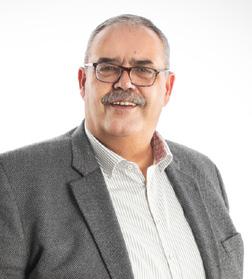
Geidea
Payment service provider Founder: Abdullah Faisal Al-Othman Established in: 2008 Headquarters: Saudi Arabia Geidea offers digital banking technology, POS terminals, and business management solutions for both financial institutions and small businesses in retail and digital commerce. In 2021, it developed and launched a contactless mobile POS payment solution. The company employs more than 1,000 people and has 150,000 merchants. It provides support to more than 700,000 payment terminals and ATMs within Saudi. In 2021, Geidea was granted a license from the Saudi Central Bank to process end-to-end payment solutions. The company processed transactions worth $126.2 million in 2021.

HyperPay
Payment gateway Founder: Muhannad Ebwini Established in: 2015 Headquarters: Saudi Arabia HyperPay offers ecommerce payment services and is launching new products such as merchant cash advance, B2B solutions, card issuing, and open banking for merchants and governments. The company processed 112 million transactions worth a combined $4.7 billion in 2021. In June 2022, the Riyadh-based company raised $36.7 million in a funding round led by Mastercard to support regional expansion into Egypt, Qatar, and Oman. The company has seven regional offices and employs 100 people.

MadfooatCom for ePayments Company
Bill presentment and payment system Founder: Nasser Saleh Established in: 2013 Headquarters: Jordan MadfooatCom provides online payment services and real-time bill presentation. It operates in Jordan, Palestine, and Oman and has 67,000 active users and over a million app downloads. In 2014, the company won an exclusive tender from the central bank of Jordan to build, operate, and administrate the electronic bill presentment and payment service, eFAWATEERcom, across the country, which is connected to all banks in Jordan, as well as mobile wallets, post offices, and payment service providers. In 2021, the company processed transactions worth $13.3 billion.
Mercury Payments Services
Payment scheme Founders: Muzaffer Hamid,Muzaffar Khokhar Established in: 2016 Headquarters: U.A.E. Mercury Payments Services enables banks, government entities, and businesses to issue payment cards for ATMs and merchant outlets across the U.A.E. Its partnership with the Discover network connects it to other payment schemes, including RuPay in India, JCB in Japan, Elo in Brazil, DINA Card in Serbia, Union Pay in China, and BC Card in Korea. This partnership means its cards are accepted at more than 59 million merchant locations and over two million ATMs in 195 countries.
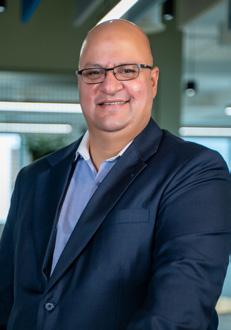
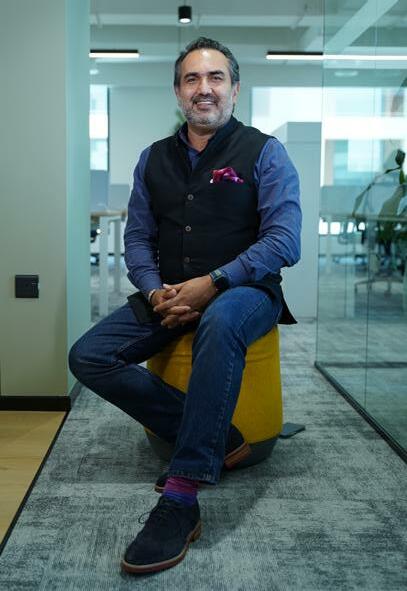
TOP 25 FINTECH COMPANIES MyFatoorah

P2P payment solutions Founder: Abdullah Aldabbous Established in: 2016 Headquarters: Kuwait MyFatoorah offers digital payment services to ecommerce merchants and business owners, including electronic invoices, QR code payments, and POS terminals. The company was first launched in Kuwait and now has operations in Egypt, the U.A.E., Saudi Arabia, Qatar, Bahrain, Oman, Turkey, Lebanon, and Jordan. It also has clients in the U.S. and Europe. MyFatoorah processed transactions of nearly $2.9 billion in 2021, and its app has hit over 255,000 downloads. It has 60,500 active users. MyFatoorah has also embedded shipping services in collaboration with DHL and Aramex.
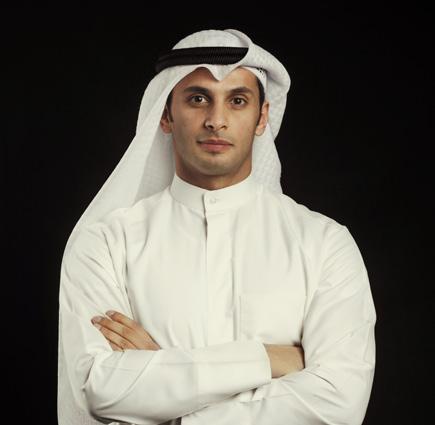
MNT-Halan
Lending, BNPL and Payments platform Founders: Mounir Nakhla, Ahmed Mohsen Established in: 2018 Headquarters: Egypt Founded as a ride-sharing and delivery app, MNT-Halan now offers digital banking services to unbanked customers, including small and micro-business lending, payments, consumer finance, bill payments, ecommerce, BNPL, and delivery services. In June 2021, Halan signed a share swap agreement with Netherlands-based MNT in a deal that allows Halan shareholders to own shares in MNT. In 2021, it raised $120 million in new funding. In June 2022, MNTHalan acquired Talabeyah, a B2B ecommerce platform that offers FMCG supplies directly to small merchants and retailers.
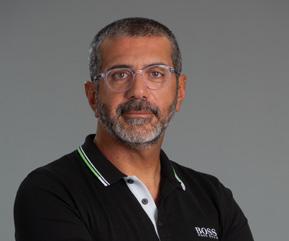
Optasia
Financial services provider for mobile operators and financial institutions Founder: Bassim Haidar Established in: 2012 Headquarters: U.A.E Optasia, formerly known as Channel VAS, provides financial services such as airtime credit services, micro-lending, buy-now-pay-later, and data monetization services. The AI-powered company claims to reach customers in more than 30 countries, with a focus on emerging markets in Sub-Saharan Africa, the Middle East, Asia, and Latin America. Optasia is headquartered in Dubai and supported by a technical team in Greece. In 2021, Optasia helped provide $2.8 billion in loans to consumers through its digital channels. Optasia has an average of 88 million monthly customers. In September 2019, Development Partners International (DPI), invested $54 million in the company, which is also backed by Abu Dhabi’s Waha Capital and the South African investment company, Ethos. Ecobank, du, Vodafone, MTN, and the United Bank for Africa (UBA) are among its notable clients.
Ottu
Payment solutions company Founder: Talal AlAwadhi Established in: 2019 Headquarters: Kuwait Ottu allows businesses to integrate digital payments into their operations without having to build their own payments infrastructure. Using Ottu’s single API, companies can connect directly with multiple payment gateways, aggregators, or PSPs. The company claims to have helped process $970 million through 2.6 million transactions in 2021. Ottu was first launched in Kuwait and has expanded into Egypt, Saudi Arabia, Bahrain, Oman, Qatar, India, and the U.A.E. It empowers merchants across multiple industry verticals like airlines, hotels, education, retail, automobile, governments, and healthcare.

Paymob
Digital payments platform Founders: Islam Shawky, Alain El Hajj, Mostafa Menessy Established in: 2015 Headquarters: Egypt Paymob enables merchants to accept and disburse payments over 28 different methods. The company had 100,000 active users in 2021. It operates in Egypt, Jordan, Pakistan, and Kenya. In November 2021, Paymob partnered with Mastercard to introduce tap-on-phone payments in Egypt, which is a contactless card and mobile wallet. In May 2022, Paymob raised $50 million in funds, bringing its total funding to $68.5 million.
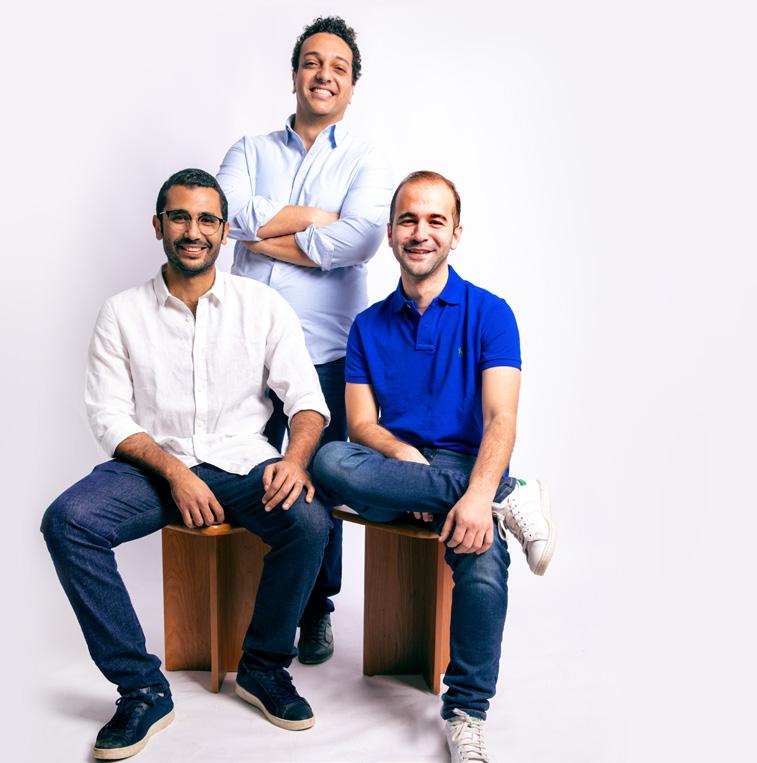
TOP 25 FINTECH COMPANIES PayTabs
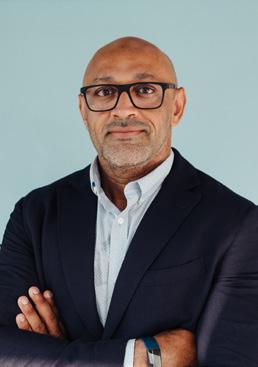
Payments solutions company Founder: Abdulaziz Al Jouf Established in: 2014 Headquarters: Saudi Arabia PayTabs offers B2B ecommerce services, including digital invoicing for businesses, QR code payments, and social media payments. It currently operates in more than seven markets across the Middle East, Africa, and South Asia, including the U.A.E., Saudi Arabia, and Egypt. In 2021, PayTabs launched PT Touch, which transforms smartphones into merchant POS terminals. The company processed over $4 billion worth of transactions in 2021, while its app recorded 10,376 downloads with 337,227 active users. In 2022, the company launched its unified payments transaction processing platform, PayTabs SwitchOn.
Rain
Crypto-asset exchange Founders: Abdullah Almoaiqel, Yehia Badawy, Adam Nelson, Joseph Dallago Established in: 2017 Headquarters: Bahrain Rain allows traders to buy, sell and store approved cryptocurrency across MENA countries, including Bahrain, the U.A.E., Kuwait, Oman, Saudi Arabia, and Qatar. In January 2022, the company secured $110 million in a funding round co-led by Paradigm and Kleiner Perkins. Rain Management was licensed as a crypto-asset service provider by the Central Bank of Bahrain in 2019. It currently operates in the GCC and Turkey. It plans to expand into Pakistan.
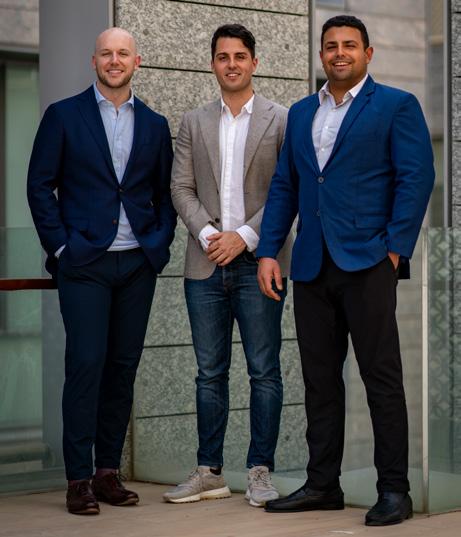

Postpay
Buy now, pay later platform Founders: Tariq Nadeem Sheikh, Dani Molina Carmona Established in: 2019 Headquarters: U.A.E. Postpay allows shoppers to split payments across three monthly installments with no interest or fees. It works with more than 1,000 brands, such as H&M, Footlocker, and Dermalogica, as well as other regional merchants. It handled over $500 million in transactions in 2021. As of July 2022, its app had 400,000 downloads and more than a million active users. Postpay currently operates in the GCC countries, including the U.A.E. and Saudi Arabia.
Rasan
Insurtech and banking solutions Founders: Moayad Alfallaj, Suliman Alfallaj, Thamer Alfallaj Established in: 2016 Headquarters: Saudi Arabia Rasan offers insurance and banking solutions through Tameeni Motor, Tameeni SME Health, Awalmazad Motor Auctions, and TrezaMotor Leasing. Tameeni enables retail customers to compare insurance prices and coverage, then select and pay for a policy. Treza supports vehicle leasing teams at banks across Saudi. Rasan has offices in Riyadh, Dubai, and Cairo. Through the platform, customers bought insurance policies worth over $674 million in 2021. Rasan raised $24 million in a funding round led by Impact46 in November 2021.

Sarwa
Online independent investment platform Founders: Mark Chahwan, Nadine Mezher, Jad Sayegh Established in: 2017 Headquarters: U.A.E. Sarwa is an investment and personal finance platform. With more than 100,000 registered users, it provides a hybrid model with access to on-demand investment experts and customer support. Sarwa Trade is a self-directed zerocommission platform that allows clients to buy and sell over 4,000 publicly traded stocks and ETFs listed on major U.S. exchanges. In August 2021, Sarwa raised $15 million in a Series B funding round.
tabby
Buy now, pay later platform Founders: Hosam Arab, Daniil Barkalov Established in: 2019 Headquarters: U.A.E. and Saudi Arabia
tabby provides BNPL solutions to over 1.1 million active shoppers across the U.A.E. and Saudi Arabia, who use it to access over 3,000 brands, including Adidas, IKEA, SHEIN, and Marks & Spencer. In 2021 alone, tabby raised $50 million in equity funding and $50 million in debt financing. In March 2022, the company raised another $54 million led by Saudi venture capital firm STV and Sequoia Capital India, bringing its total funding to date to over $180 million.
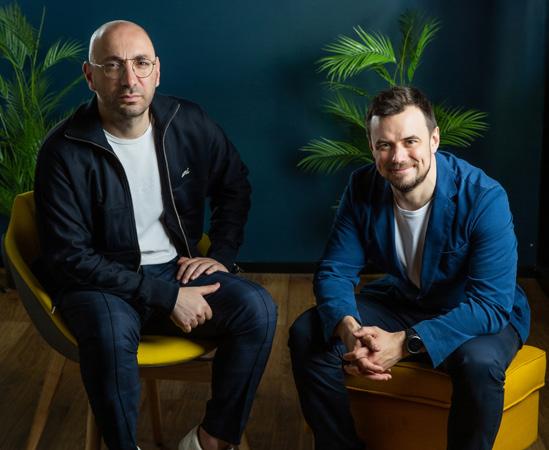
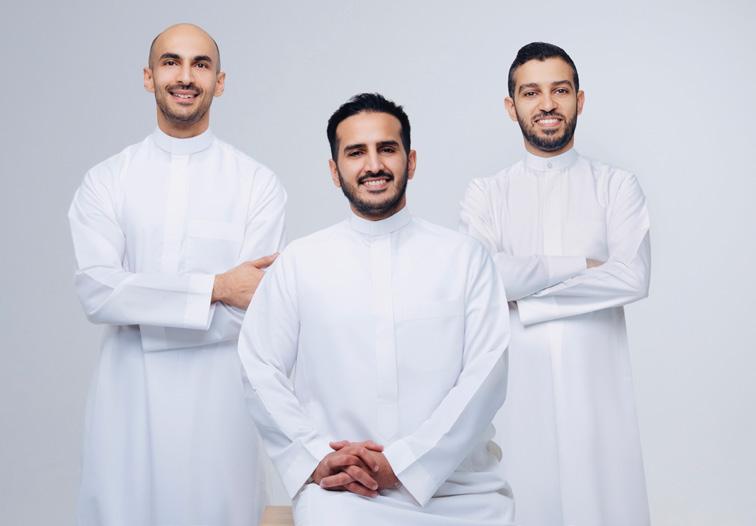
Tamara
Buy now, pay later platform Founders: Abdulmajeed Alsukhan,Turki Bin Zarah, Abdulmohsen Albabtain Established in: 2020 Headquarters: Saudi Arabia
Tamara allows online and in-store shoppers in Saudi Arabia, the U.A.E., and Kuwait to split payments across three installments with no fees or interest. It processed transactions worth a total of $267 million in 2021. It works with brands such as SHEIN, Namshi, IKEA, Golden Scent, and Styli. As of July 2022, Tamara’s app had 1.8 million downloads with three million active users. It has raised $116 million in funding and employs more than 200 people across the U.A.E., Saudi, Kuwait, Germany, and Vietnam.

Tarabut Gateway
Open banking platform Founder: Abdulla Almoayed Established in: 2018 Headquarters: U.A.E. Tarabut Gateway is a regulated open banking platform that connects a regional network of banks and Fintechs via an API that helps facilitate and distribute personalized financial services. The company raised $13 million in seed funding in February 2021 and $12 million in November 2021. The platform has offices across Bahrain, the U.A.E., and Saudi Arabia. It established telco open banking payments with Zain Bahrain at the end of 2021. It recently announced partnerships with Riyad Bank, Saudi British Bank (SABB), Alinma Bank, and Banque Saudi Fransi. The company claims to have connected to 17.2 million bank accounts and acquired 90% bank coverage in Bahrain.
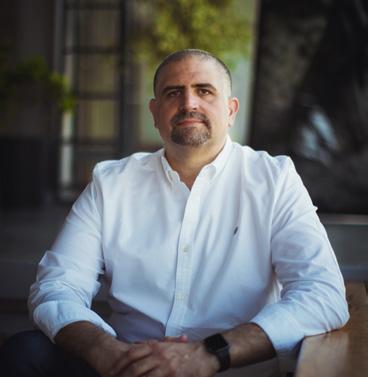
Telr
Online payment gateway Founder: Khalil Alami Established in: 2014 Headquarters: U.A.E. With a presence in the U.A.E. and Saudi Arabia, Telr enables merchants to accept digital payments in over 120 currencies and 30 languages. Other services include social commerce, QR Code payments, anti-fraud protection, BNPL, and a tool for creating an online store in minutes. Telr processed nine million transactions worth a total of $1 billion in 2021. In November 2021, it raised an equity investment of $15 million from the Indian payments and API banking solutions company, Cashfree Payments, bringing its total funding to $29 million.
UPayments
Payment service provider Founders: Ali AlHabshi, Nasser Al Humaidi Established in: 2016 Headquarters: Kuwait UPayments is a payment service provider offering online invoicing systems, an ecommerce platform, property management, and a payment gateway. The company is licensed by the Central Bank of Kuwait and provides its services through its website and app. In 2021, UPayments processed over $689 million in transactions. Its app has been downloaded over 150,000 times. The company has partnerships with the National Bank of Kuwait and Zain Telecom. It currently operates in Kuwait, Qatar and Saudi Arabia.
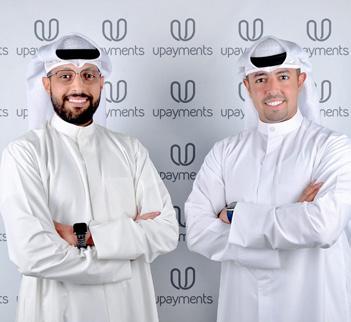
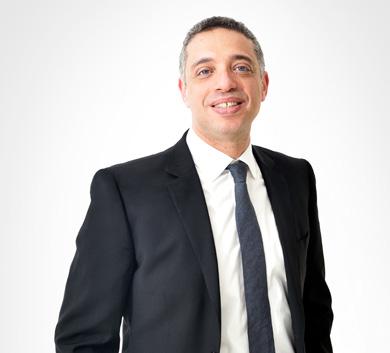
valU
Buy now, pay later platform CEO: Walid Hassouna Established in: 2017 Headquarters: Egypt valU, a subsidiary of EFG Hermes Holding, is a BNPL app that allows users to shop across more than 5,000 POS terminals and 330 websites in Egypt, with payment plans of up to 60 months. The platform saw a 140% growth in transactions in 2021. App downloads and app users hit 898,000 and 672,245, respectively, as of May 2022. In June 2022, the Alhokair family agreed to acquire a 4.99% stake in valU through a capital injection of $12.4 million. That followed an option agreement with Amazon, whereby Amazon agreed to acquire $10 million in EFG Hermes GDRs, with the option to replace that investment into valU at a future date, translating into a stake of 4.255% of the issued share capital of valU. The company plans to expand into Saudi Arabia in 2022.
Why Your Next Trip Should Be To Porto Montenegro
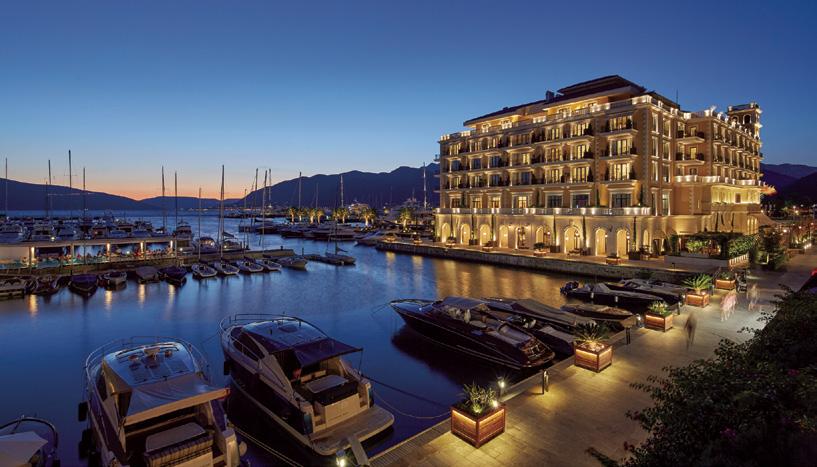
Located on UNESCO protected Boka Bay, Porto Montenegro is renowned for being one of the most magical countries in Europe, and is bordered by Serbia, Albania, Croatia, and Bosnia & Herzegovina. Its unspoilt natural beauty extends into the azure waters of the Adriatic, along 295 kilometers of coastline. Independent from Serbia since 2006, Montenegro is a young but stable democracy with an open economy.
With over 280 days of sunshine, Porto Montenegro is a short drive from Lake Skadar, the largest lake in Southern Europe, often overlooked by the tourist trail. It is also three hours’ drive to Tara Canyon, the second deepest canyon in the world. In winter and early spring, the snow-capped mountains of Kolasin and Zabljak, reaching more than 2,000 meters high, provide the ideal setting for skiing away from Europe’s more crowded resorts.
The government of Montenegro has extended the deadline for its Citizenship By Investment (CBI) scheme until December 31, 2022. The program encourages individuals to make an investment from as little as $264,000 in an approved under-developed area, to $476,000 in developed properties like Porto Montenegro, a luxury marina village in the Bay of Kotor.
The country is also among the fastest-growing tourist destinations according to a World Tourism Organisation report. In 2019, the country brought in $1.2 billion from tourism alone. Foreign direct investment has also increased, with the country reporting close to $699 million in 2020.
Strategic Location Within a three hour flight of major European capitals, Porto Montenegro is a destination for businesses and entrepreneurs, as it is one of the fastest-growing economies in the Balkans. Its economy is suitable for investors with competitive tax rates for individuals and corporations, along with capital gains tax of up to 15%, and the stability of the euro currency. It’s also served by three international airports in Tivat, Podgorica, and Dubrovnik.
Moreover, the favorable economic and political climate in Montenegro provides a real investment opportunity based on economic stability, with the euro being the official currency. Montenegro’s recent affiliation with the North Atlantic Treaty Organization (NATO) and the European Union demonstrates the government’s continued commitment to maintaining security and stability locally and globally.
Montenegro has four UNESCO World Heritage sites including the Bay of Kotor, renowned for being the largest freshwater lake in Europe, featuring magnificent mountains for skiing. The country’s CBI program gives buyers the opportunity to make a legacy property investment in Porto Montenegro’s new urban neighborhood, Boka Place, which features SIRO, a new immersive lifestyle experience from industry leaders Kerzner International. The company is a global developer and operator of iconic destination resorts including Atlantis Resort and Residences and the ultra-luxury One & Only Resorts and Private Homes. It also grants owners a Montenegrin passport which allows freedom of movement for the main applicant and their family across 124 countries, including the Schengen Area, Russia, and Turkey. What’s more, with the country’s planned EU accession by 2025, holders will be eligible for additional benefits.
Porto Montenegro is home to the world’s first platinum-status 460-berth marina, which offers the ultimate in waterfront living for the yachting community, with tax-free fuel, 24/7 yacht assistance, seven percent marine-related tax, and a world-class yacht club.
Porto Montenegro marina utilizes the existing infrastructure of the former Yugoslav naval facility upon which it is built. It features 450 berths (with 850 planned in total), accommodating the largest superyachts in the world and providing the highest level of service
Scan this QR code to open the website



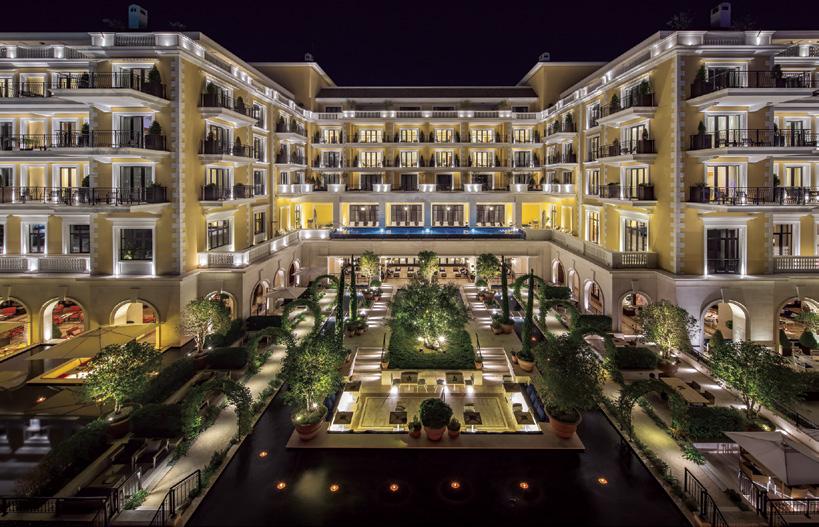
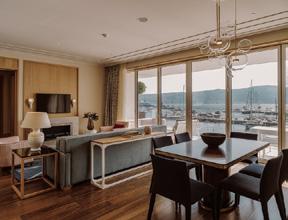

and amenities, including a nearby shipyard with dry-dock and repair facilities.
In addition, the project contributed to the construction of a vibrant coastal community that includes waterfront residences, a hotel, restaurants, shops, and recreational facilities.
Activities The site is bustling with life. There are numerous bars and bistros and an eclectic selection of boutiques and international brands, such as Dior. There is also a year-round schedule of events for families, businesspeople, and crew, along with education facilities including Knightsbridge School International, a day and boarding school for children aged three to 18 years. These advantages, along with easy access to areas of outstanding natural beauty, make this the perfect destination for residents, boat owners, charterers, and families alike.
Established in 2010, the Porto Montenegro Yacht Club is a haven for sailing education and a venue for captains, crew, and local sailors to relax and unwind after a day on the water. Over the years, the club has grown its fleet, event calendar, and activities offering, as well as its network of reciprocal yacht clubs.
One of the main features of the marina is the 64-meter PMYC pool boasting unparalleled views over Boka Bay, which has been listed by the likes of Condé Nast Traveller as one of the world’s most iconic pools.
The club combines tradition with contemporary luxury, challenging the standards of the most prestigious yacht clubs in the world. Members have access
Scan this QR code to open the website


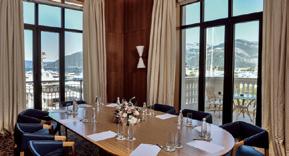
to an exclusive members lounge with an onsite restaurant and bar, nightclub, sailing and rowing facilities, gym, and tennis courts, all with five-star hospitality.
Inspired by typical Montenegrin architecture, the village offers wide waterfront promenades and winding, asymmetrical streets that weave past stone buildings to reveal hidden piazzas and alcoves. As well as inviting leisurely exploration and recreating a more traditional sense of discovery, the tree-lined streets and market squares are enlivened by al fresco cafés – an integral part of Montenegrin culture.
A combination of locally quarried stone facades and subtly colored buildings brings warmth to the scheme. Roofing follows the traditional form of natural terracotta and clay tiles, and interiors are modern, taking their inspiration from the tones and shades of the surrounding environment.
Outdoor features are integral to the overall design with balconies, gardens, and roof terraces incorporated into each building and apartment. Landscaping plays a vital role, filtering into the inner courtyards of each building from the adjacent verdant streets.
Boka Place: A key project under development Boka Place is Porto Montenegro’s latest project which will be completed by the end of 2023. Families and individuals can create a home in the heart of Europe, known as the jewel on the Adriatic Sea, as the program allows investors to fast-track straight to a citizenship application, without having lived in the country beforehand. All applicants to CBI are required to invest in approved real estate projects in the country, such as Porto Montenegro’s urban Boka place neighborhood.
The urban neighborhood will comprise three residential areas namely Mistral, Ostro, and Sirocco.
Residents will benefit from access to SIRO, Kerzner International’s five-star hotel, the first flagship, fivestar SIRO in Boka Place, offering an immersive hotel lifestyle experience. With fitness and wellness at the core of the brand, SIRO will feature 96 hotel rooms and 144 hotelmanaged residences, as well as 69 private residences managed by M Residences Rental Management Service.
The hotel-managed residences – housed within the buildings of Mistral, Ostro, and Sirocco – can be secured by buyers through single or multiple investments from the new Kerzner-Managed Residence portfolio to meet the CBI minimum investment threshold.
Residents of Mistral, Ostro, and Sirocco will benefit from access to SIRO’s hotel concierge services, complete with the rooftop pool and bar and full access to all health and wellness facilities. These facilities include an innovative fitness club, swimming pools, the Recovery Lab, and dedicated space for yoga.The offering also includes nutrition-led dining, revitalization treatment rooms, an infrared sauna, a flotation tank, a cryotherapy room, and a meditation hideaway.
Homeowners will also have the long-term benefit of participating in the SIRO rental pool program. Private residences offer a total of 69 residences, with 26% of the portfolio available within the first building, Thea, reserved or sold. The final building, Alba, will be released in 2022.
TOP 30 BANKS THE MIDDLE EAST’S
TOP 30 BANKS
Banks in MENA have emerged stronger from the pandemic crisis, with the top 30 listed players in the region seeing their combined assets grow in value by 13% to hit $2.5 trillion by the end of 2021, compared to $2.3 trillion in 2020, while profits climbed by 37% to over $34 billion. The aggregate market cap of the 30 banks rose to nearly $587 billion as of June 28, 2022, an increase of 23% compared to $478.7 billion a year earlier. They have combined revenues of over $107 billion.
Gulf banks dominate the 2022 list, with 25 out of the 30 based in the GCC. Qatar’s QNB Group tops the list with $300.3 billion in total assets, followed by the U.A.E.’s FAB, and Saudi’s Al Rajhi Bank and Saudi National Bank. Saudi and U.A.E. are the most represented countries in the list, with 10 and seven banks, respectively. Qatar follows with four banks, while Morocco has three.
The region’s banks are poised for further growth in 2022, fueled by higher oil prices. According to a recent report by Fitch, high oil prices, strong economic activity, and rising interest rates are expected to help banks in the U.A.E. bring their profitability back to prepandemic levels in FY 2022. S&P Global Ratings expects rated banks across the Middle East and Africa to suffer little direct fallout from the Russia-Ukraine conflict due to their limited dealings with Russian and Ukrainian counterparties.
Methodology We collected data from Middle East banks listed on stock exchanges in the Arab world based on their reported market value, revenues, assets, and profits for 2021. Each metric was given equal weight, and banks with the same final scores were given the same rank.
We excluded banks that hadn’t disclosed their 2021 audited financial statements as of June 28, 2022. Currency exchange rates and market cap calculations were taken as of June 28, 2022.
Aggregate market value Aggregate revenue Aggregate profit Aggregate assets
To nominate yourself or someone else for our lists, email: info@forbesmiddleeast.com

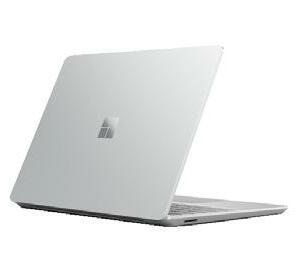
THE MIDDLE EAST’S TOP 30 BANKS
1. QNB Group
Group CEO: Abdulla Mubarak Al-Khalifa Country: Qatar Market Value: $51.9 billion Revenues: $14 billion Profits: $3.6 billion Assets: $300.3 billion
QNB is the largest bank in the Middle East and Africa and the second-largest entity in the region in terms of assets after Saudi Aramco. The group has a presence in more than 31 countries across three continents. It employs more than 27,000 people across 1,000 locations. QNB has acquired stakes in various financial institutions, including a 20% stake in Togobased Ecobank, a 38.6% stake in Jordan’s Housing Bank for Trade and Finance, 40% of the U.A.E.’s Commercial Bank International (CBI), and nearly 100% of QNB Tunisia. In April 2022, it allowed foreign ownership limit of up to 100%.
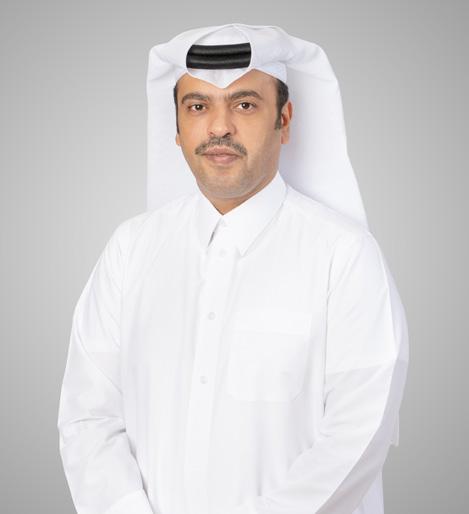
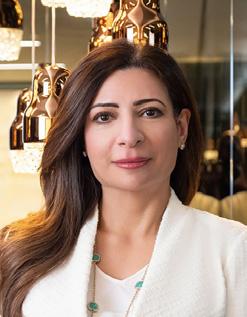
2. First Abu Dhabi Bank (FAB)
Group CEO: Hana Al Rostamani Country: U.A.E. Market Value: $56.9 billion Revenues: $8.2 billion Profits: $3.4 billion Assets: $272.4 billion
The U.A.E.’s largest bank, FAB was created by a merger between the First Gulf Bank and the National Bank of Abu Dhabi in 2016. Today, it has operations in 19 markets across five continents with three million customers and 6,600 employees globally. In 2021, FAB acquired Bank Audi’s unit in Egypt. It was seeking to control a majority stake in Egyptian-based financial services institution EFG Hermes Holding before withdrawing the offer in April 2022, citing global market uncertainty and volatile macroeconomic conditions.
Saudi Arabia
Banks Market Value Revenues Profits Assets
2. Saudi National Bank (SNB)
Group CEO and Managing Director: Saeed Al-Ghamdi Country: Saudi Arabia Market Value: $79.3 billion Revenues: $8.6 billion Profits: $3.4 billion Assets: $243.8 billion
The largest bank in Saudi Arabia, SNB was formed by the merger of the National Commercial Bank and Samba Financial Group in April 2021. Today, it has subsidiaries and affiliates operating in eight countries. It has 11 million customers, more than 500 branches, and 476 selfservice kiosks. Saudi’s Public Investment Fund (PIF) owns 37.2% of the bank.
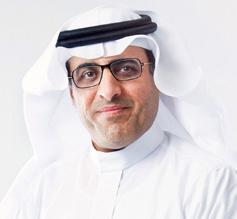
2. Al Rajhi Bank
CEO: Waleed Abdullah Ali Al-Mogbel Country: Saudi Arabia Market Value: $90.7 billion Revenues: $7.1 billion Profits: $3.9 billion Assets: $166.3 billion
Established as an exchange house in 1957 and converted to a bank in 1988, Al Rajhi is the largest bank in the region in terms of profits and market cap. The bank has a network of over 521 branches and 212 remittance centers across the kingdom. In January 2022, it acquired IT services provider the Ejada Systems Company to expand its digital banking services. Al Rajhi Bank claims to have the largest customer base in Saudi Arabia, with over 12 million customers.
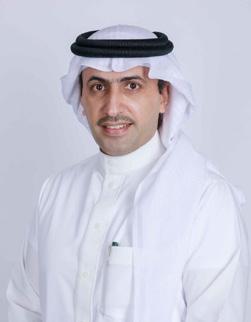
5. Emirates NBD
Group CEO: Shayne Nelson Country: U.A.E. Market Value: $23.4 billion Revenues: $9.8 billion Profits: $2.5 billion Assets: $187.2 billion
Emirates NBD was created by a merger between EBI and NBD. It operates in the Middle East, North Africa, and Turkey, and its international operations contributed 38% of total income in 2021. In 2021, the company’s net profit hit $2.5 billion, an increase of 34% compared to 2020. In the same year, Emirates NBD signed an agreement with Masdar to structure and help manage the first sustainable real estate investment trust (REIT) in the U.A.E., worth $258.4 million.
6. National Bank of Kuwait (NBK)
Vice Chairman and Group CEO: Isam J. Al-Sager Country: Kuwait Market Value: $25.5 billion Revenues: $3.7 billion Profits: $1.2 billion Assets: $109 billion
NBK has 140 branches across 14 countries. The bank employs 7,511 people globally. In February 2022, the Arab Jordan Investment Bank acquired NBK-Jordan for an undisclosed sum. In March 2022, NBK launched its Sustainable Financing Framework to integrate environmental, social, and governance standards into the bank’s operations. It has developed internal targets to reduce gross operational emissions by 25% by 2025, and it aspires to become net-zero operationally by 2035.
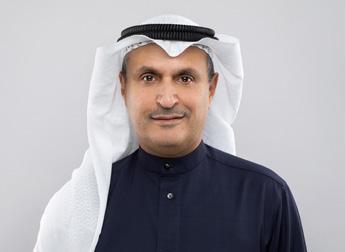
IMAGES FROM SOURCE U.A.E.
Banks Market Value Revenues Profits Assets
6. Riyad Bank
CEO: Tareq Al Sadhan Country: Saudi Arabia Market Value: $27 billion Revenues: $3.6 billion Profits: $1.6 billion Assets: $86.9 billion
Riyad Bank has 340 branches in Saudi Arabia, one in the U.K., an agency in the U.S., and a representative office in Singapore. The bank employs over 6,620 people. It completed the issuance of a SAR-denominated Tier 2 capital-eligible Sukuk valued at $800 million in February 2021 and another U.S.-dollar-denominated Tier 1 capital Sukuk worth $750 million in February 2022. Riyad Bank signed an agreement with the Yanbu Chamber of Commerce and Industry in September 2021 to launch new products, initiatives, and financing solutions that can enhance the role of SMEs in achieving the Saudi Vision 2030.
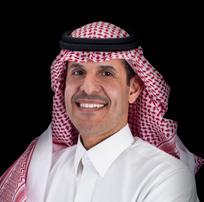
8. ADCB Group
Group CEO: Ala’a Eraiqat Country: U.A.E. Market Value: $17 billion Revenues: $4 billion Profits: $1.4 billion Assets: $119.9 billion
The ADCB Group was formed in 2020 by the merger of the Abu Dhabi Commercial Bank and the Union National Bank and the acquisition of the Al Hilal Bank. Today, it has over 54 branches across the U.A.E. It signed a strategic partnership with the Abu Dhabi Residents Office in February 2022 to launch a new banking proposition for U.A.E. Golden Visas customers. In April 2022, it announced an agreement with U.A.E. Trade Connect to use the blockchain platform to help de-risk trade finance.
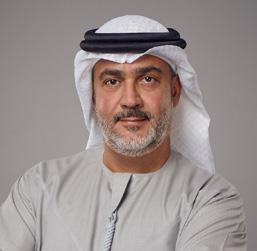
9. Kuwait Finance House (KFH)
Acting Group CEO: Abdulwahab Iesa Alrushood Country: Kuwait Market Value: $24.7 billion Revenues: $3.6 billion Profits: $1 billion Assets: $71.4 billion
KFH was the first Islamic bank to be established in Kuwait in 1977. Today, its operations extend to Bahrain, Saudi Arabia, the U.A.E., Turkey, Malaysia, and Germany. The bank has 526 global branches and employs 13,000 people. In early July 2022, the Central Bank of Kuwait approved the acquisition of 100% of the capital shares of Ahli United Bahrain (AUB) by KFH, with KFH offering one share for every 2.695 shares of AUB. Kuwait’s General Authority for Investment owns over 24.1% of KFH, while the General Authority for Minors Affairs owns 10.48%, and the General Secretariat of Awqaf owns 7.3%.
10. Dubai Islamic Bank (DIB)
Group CEO: Adnan Chilwan Country: U.A.E. Market Value: $11.3 billion Revenues: $3.2 billion Profits: $1.2 billion Assets: $76 billion
DIB is one of the world’s largest Islamic banks. In February 2022, DIB became a member of U.A.E. Trade Connect, a commercialized blockchain platform co-created by Etisalat Digital, several banks in the U.A.E., and Avanza Innovations. DIB announced in August 2021 that it is increasing its foreign ownership limit from 25% to 40%. The Investment Corporation Of Dubai is the biggest shareholder in DIB, holding 28%.
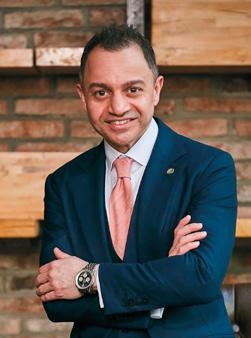
Qatar
Banks Market Value Revenues Profits Assets
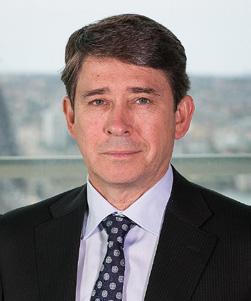
11. Saudi British Bank (SABB)
Managing Director and CEO: Tony Cripps Country: Saudi Arabia Market Value: $21.8 billion Revenues: $2.6 billion Profits: $854 million Assets: $72.6 billion
SABB was established in 1978 as a Saudi joint-stock company. It provides commercial, private, and Islamic banking services to individuals and companies through 108 branches in Saudi Arabia. The bank completed a merger with Alawwal Bank in June 2019. The HSBC Group owns 31% of SABB’s shares.
12. Banque Saudi Fransi (BSF)
Acting CEO: Bader Alsalloom Country: Saudi Arabia Market Value: $15.4 billion Revenues: $2.2 billion Profits: $920 million Assets: $57.5 billion
BSF was known as the French Banque de l’Indochine et de Suez until 1977, when foreign banks in Saudi Arabia were nationalized. The bank has 84 branches and employs more than 3,000 people. Kingdom Holding is the bank’s largest shareholder with a 16.2% stake, followed by Rashed Abdul Rahman AlRashed & Sons Group and Ram Holdings with 9.8% and 9%, respectively.
12. Qatar Islamic Bank (QIB)
Group CEO: Bassel Gamal Country: Qatar Market Value: $14.4 billion Revenues: $2.3 billion Profits: $976 million Assets: $53.3 billion
QIB has 22 branches in Qatar and one branch in Sudan. The Qatar Investment Authority owns 17.2% of QIB. In 2022, Qatari authorities allowed QIB to raise its foreign ownership limit to 100% with immediate effect. The bank’s network includes QInvest, which is working with the Qatar Insurance Company to establish a Qatar-based company in the Islamic asset management field in 2022.

14. Attijariwafa bank
Chairman and CEO: Mohamed El Kettani Country: Morocco Market Value: $9.1 billion Revenues: $4.3 billion Profits: $630 million Assets: $61 billion
Attijariwafa Bank is the largest bank in Morocco and one of the largest in Africa. The bank employs more than 20,583 people, has nearly 10.6 million customers, and operates in 26 countries. In 2021, it launched a new strategic plan @MBITIONS 2025 to boost its position as an African banking and financial group, leverage disruptive digital and Big Data technologies, and further align with international standards in terms of efficiency, risk, and compliance. In March 2022, Attijariwafa bank and the Moroccan Agency for Energy Efficiency signed an MoU to boost energy efficiency cooperation and green economy financing.
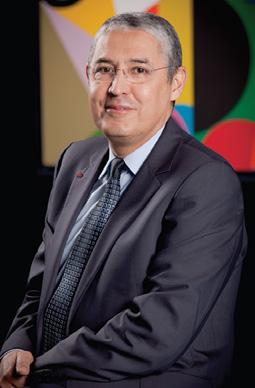
IMAGES FROM SOURCE Morocco
Banks Market Value Revenues Profits Assets
15. Alinma Bank
CEO: Abdullah bin Ali AlKhalifa Country: Saudi Arabia Market Value: $18.3 billion Revenues: $2 billion Profits: $723 million Assets: $46.3 billion
Alinma Bank was listed on the Saudi Exchange in 2008. By the end of 2021, the bank had 2.9 million customers connected via its digital platforms, including 1.2 million active users of its Smart App. Saudi’s Public Investment Fund (PIF) owns 10% of Alinma Bank, making it the bank’s largest shareholder.
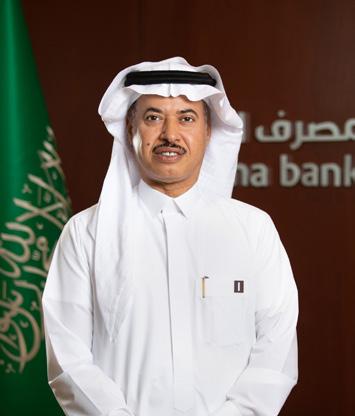
16. Arab National Bank (ANB)
CEO and Managing Director: Obaid A. Alrasheed Country: Saudi Arabia Market Value: $12.1 billion Revenues: $1.9 billion Profits: $579 million Assets: $51.3 billion
Established in 1979, ANB has more than two million customers and 216 premises across Saudi Arabia. It also has investment banking and insurance divisions, ANB Invest and ANB Insurance. In April 2022, the bank signed a $293.3 million agreement with the SME General Authority “Monsha’at” to support SMEs and entrepreneurs with financing and banking services.
17. Arab Bank
CEO: Randa Sadik Country: Jordan Market Value: $4.5 billion Revenues: $3 billion Profits: $315 million Assets: $63.8 billion
The Arab Bank was established in 1930 in Palestine. Its headquarters were moved to Amman in 1948. It has more than 600 branches around the world and a subsidiary Islamic bank in Sudan. The bank reported net profits of $315 million in 2021, an increase of 61% compared to 2020.
18. Commercial Bank
Group CEO: Joseph Abraham Country: Qatar Market Value: $7.8 billion Revenues: $2.1 billion Profits: $633 million Assets: $45.5 billion
The Commercial Bank has 30 branches in Qatar. It also owns and operates the “Diners Club” franchise in Qatar and Turkey and the Alternatif Bank in Turkey. In February 2022, the bank collaborated with the Qatar General Electricity and Water Corporation “Kahramaa” to launch a direct debit service. Joseph Abraham has been CEO of the bank since 2016, before which he was CEO of ANZ Indonesia.
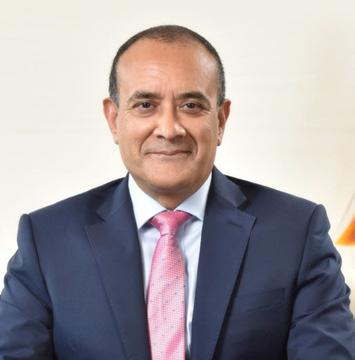
Kuwait
Banks Market Value Revenues Profits Assets
19. Ahli United Bank (AUB)
Group CEO: Adel A. El-Labban Country: Bahrain Market Value: $9.3 billion Revenues: $1.6 billion Profits: $638 million Assets: $41.9 billion
AUB was formed in May 2000 by a merger of the United Bank of Kuwait PLC and the Al-Ahli Commercial Bank B.S.C. It is one of the largest banks in the Middle East. It employs 3,294 people across eight countries. The Kuwaiti Public Institution for Social Security owns 18.9% of AUB, and Bahrain’s Social Insurance Organization owns a 10.01% stake. The bank reported $607.2 million in net profits attributable to its equity shareholders in 2021, an increase of 34% compared to 2020.
20. Masraf Al Rayan
Group CEO: Fahad Al Khalifa Country: Qatar Market Value: $10.6 billion Revenues: $1.4 billion Profits: $474 million Assets: $47.8 billion
Masraf Al Rayan is a Shariah-compliant bank with 15 branches in Qatar and two in the U.K. through its subsidiary, Al Rayan Bank PLC. In November 2021, Masraf Al Rayan announced the completion of a merger with Al Khalij Commercial Bank, creating one of the largest Shariah-compliant banks in the region with nearly $50 billion in total assets.

21. Banque Centrale Populaire (BCP)
Chairman and CEO: Mohamed Karim Mounir Country: Morocco Market Value: $5.2 billion Revenues: $2.7 billion Profits: $279 million Assets: $47.6 billion
BCP is a group of 10 cooperative banks, each focusing on a region in Morocco. Through its subsidiaries, the group operates in 24 countries. In December 2021, the bank and the National Institute of Posts and Telecommunications signed a partnership to support students. In April 2022, BCP’s Business Creation Foundation and the Regional Banque Populaire of Laayoune launched a program for small projects.
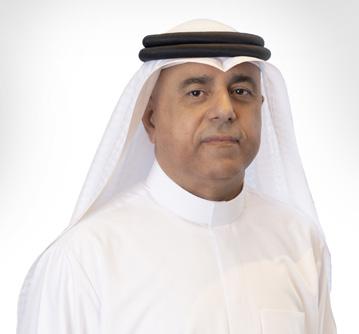
22. Abu Dhabi Islamic Bank (ADIB)
Group CEO: Nasser Al Awadhi Country: U.A.E. Market Value: $7.4 billion Revenues: $1.6 billion Profits: $634 million Assets: $37.3 billion
ADIB provides banking services to more than a million customers, with 62 branches in the U.A.E. The bank is also present in Egypt, Saudi Arabia, Qatar, Sudan, Iraq, and the U.K. In March 2022, the bank announced that it would provide financing worth $61 million for environmentallyfriendly projects in Saudi Arabia. The bank recorded more than $634 million in net profit in 2021, an increase of 45% compared to 2020.
IMAGES FROM SOURCE Bahrain
Banks Market Value Revenues Profits Assets
23. Mashreq Bank
Group CEO: Ahmed Abdelaal Country: U.A.E. Market Value: $4.4 billion Revenues: $2.5 billion Profits: $293 million Assets: $48.2 billion
Mashreq Bank was founded by the Al Ghurair Group and is among the oldest banks in the U.A.E. The Al Ghurair Group remains a major shareholder in the bank through its subsidiaries. Mashreq currently operates in the U.A.E., Bahrain, Kuwait, Egypt, Hong Kong, India, Qatar, the U.K., and the U.S.
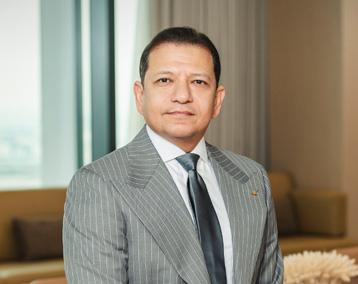
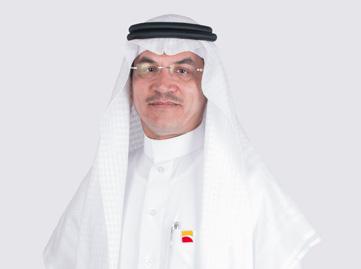
25. Bank Albilad
CEO: Abdulaziz Mohammed Alonaizan Country: Saudi Arabia Market Value: $11.9 billion Revenues: $1.3 billion Profits: $450 million Assets: $29.6 billion
Established in 2004, Bank Albilad provides Shariahcompliant banking services. The bank operates over 150 branches, five sales centers, and over 168 Enjaz remittance centers across Saudi Arabia. It recorded net profits of $450 million in 2021, an increase of 25% compared to 2020. The bank also owns the Albilad Investment Company and the Albilad Real Estate Company Ltd.
24. Commercial International Bank (CIB)
CEO and Managing Director: Hussein Abaza Country: Egypt Market Value: $3.9 billion Revenues: $2.7 billion Profits: $713 million Assets: $26.8 billion
CIB was established in 1975 as a joint venture between the National Bank of Egypt and the Chase Manhattan Bank. It employs 7,307 people and serves more than 1.6 million customers across 213 branches. CIB has several subsidiaries, including CVentures and the Mayfair CIB Bank in Kenya. In April, Alpha Oryx Limited—a subsidiary of the U.A.E’s ADQ—acquired an 18.6% stake in CIB for $987.5 million. Hussein Abaza became CEO in 2017.
26. Bank Muscat
CEO: Waleed Khamis Al Hashar Country: Oman Market Value: $5.1 billion Revenues: $1.7 billion Profits: $494 million Assets: $34 billion
Bank Muscat has branches in Oman, Saudi Arabia, and Kuwait, and representative offices in Dubai, Iran, and Singapore. The bank recorded net profits of $494 million in 2021, an increase of 16.1%. The bank has provided social welfare support for more than 1,080 Omani families through its “Tadhamun” program, in cooperation with the Omani Ministry of Social Development.
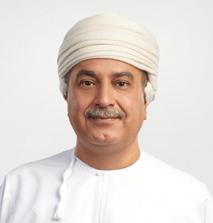
Jordan
Banks Market Value Revenues Profits Assets
27. Bank of Africa
Chairman and CEO: Othman Benjelloun Country: Morocco Market Value: $4 billion Revenues: $2.1 billion Profits: $291 million Assets: $35.3 billion
The Bank of Africa is present in more than 20 African countries and employs more than 14,900 people. It has 2,000 points of sale, serving 6.6 million customers. In 2019, the Bank of Africa and Casablanca-based business school the ISCAE Group jointly launched the “Blue Space” incubator. Located on the ISCAE campus, BlueSpace offers students and entrepreneurs tools to help develop business ideas. Moroccan billionaire Othman Benjelloun is the Chairman and CEO of the bank.
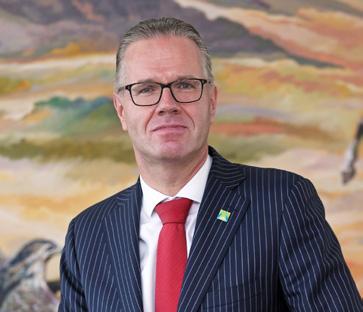
28. Commercial Bank of Dubai (CBD)
CEO: Bernd van Linder Country: U.A.E. Market Value: $3.5 billion Revenues: $1 billion Profits: $395 million Assets: $31.1 billion
CBD offers retail and commercial banking products and services, as well as Shariah-compliant banking services. It has 15 branches in the U.A.E. The Investment Corporation of Dubai is CBD’s largest shareholder with 20%, followed by Al-Futtaim Private Limited with 10.5%.
29. Saudi Investment Bank (SAIB)
CEO: Faisal Abdullah Al-Omran Country: Saudi Arabia Market Value: $5.3 billion Revenues: $908 million Profits: $283 million Assets: $27.1 billion
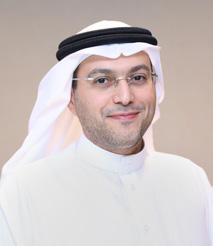
SAIB provides investment banking services for individuals and companies, as well as stock trading, asset management, leasing, mortgage, and insurance services. The bank operates through 51 branches in Saudi Arabia. The General Organization for Social Insurance is its largest shareholder, with 25.6%.
30. Bank Aljazira (BAJ)
CEO and Managing Director: Naif A. Al Abdulkareem Country: Saudi Arabia Market Value: $5 billion Revenues: $1.2 billion Profits: $268 million Assets: $27.4 billion
BAJ was created in 1975 after it absorbed the activities and services of the National Bank of Pakistan. Today, the Shariah-compliant bank has 81 branches and employs 2,420 people. Its subsidiaries include AlJazira Capital, the Aman Development and Real Estate Investment Company, the Aman Insurance Agency Company, and AlJazira Securities Limited.
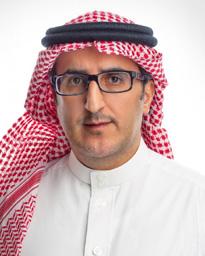
Oman
Banks Market Value Revenues Profits Assets
IMAGES FROM SOURCE Egypt
Banks Market Value Revenues Profits Assets









